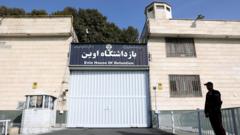In a surprising move, Guinea's ruling junta has issued a pardon for former military leader Moussa Dadis Camara, who was serving a 20-year sentence for his role in one of the nation’s most devastating atrocities—the 2009 stadium massacre. The decree, announced on state television, cites health concerns as the reason for his release.
Former Guinea Leader Pardoned After 2009 Stadium Massacre Conviction

Former Guinea Leader Pardoned After 2009 Stadium Massacre Conviction
Guinea's military junta pardons ex-ruler Moussa Dadis Camara, serving time for crimes against humanity linked to a tragic stadium massacre.
During the horrific events of September 28, 2009, Camara's troops opened fire on thousands of peaceful protesters demanding a return to democratic governance, resulting in the deaths of over 150 individuals and widespread sexual assaults against women. Camara, who had initially seized power in a coup following the death of long-time president Lansana Conté in 2008, returned to Guinea to face justice after years of exile.
His conviction last July came after a protracted trial that spanned 22 months and implicated several of his military commanders. Following the pardon announcement, the current military government also promised compensation for the massacre victims. The proposed payouts include substantial sums for rape victims, deceased individuals, and cases of torture among others, as reported by Justice Info.
The stadium massacre, a catastrophic incident in Guinea's turbulent political history, underscored the brutality of Camel's regime that was characterized by violence and repression. Despite fleeing to Burkina Faso after surviving an assassination attempt, Camara insisted on his innocence and sought to return to the political fold.
As reactions pour in, his family expressed joy over the pardon, while the nation continues to grapple with the implications of Camara's actions and the ongoing challenges of reconciling with its violent past.
The pardon of Moussa Dadis Camara raises questions about justice and accountability in Guinea, a country still healing from the wounds of its recent history.
His conviction last July came after a protracted trial that spanned 22 months and implicated several of his military commanders. Following the pardon announcement, the current military government also promised compensation for the massacre victims. The proposed payouts include substantial sums for rape victims, deceased individuals, and cases of torture among others, as reported by Justice Info.
The stadium massacre, a catastrophic incident in Guinea's turbulent political history, underscored the brutality of Camel's regime that was characterized by violence and repression. Despite fleeing to Burkina Faso after surviving an assassination attempt, Camara insisted on his innocence and sought to return to the political fold.
As reactions pour in, his family expressed joy over the pardon, while the nation continues to grapple with the implications of Camara's actions and the ongoing challenges of reconciling with its violent past.
The pardon of Moussa Dadis Camara raises questions about justice and accountability in Guinea, a country still healing from the wounds of its recent history.




















